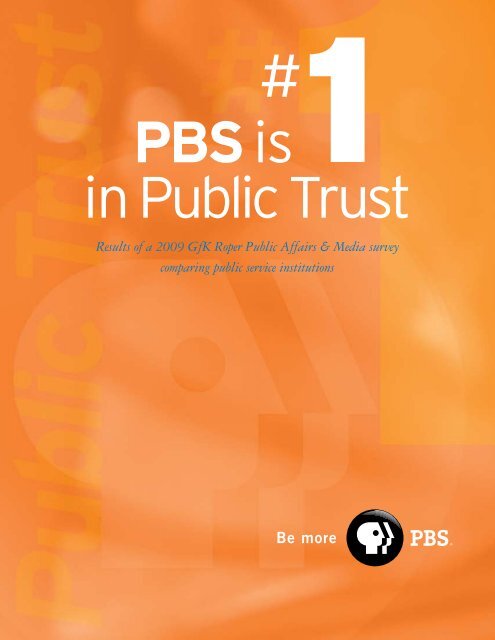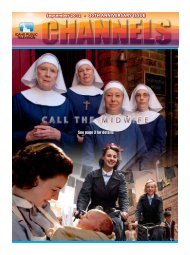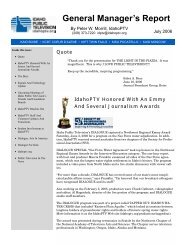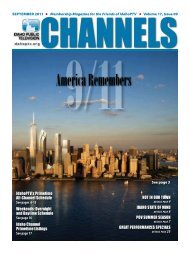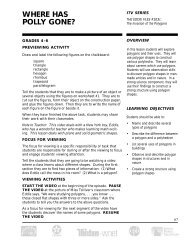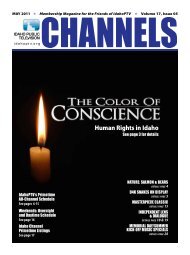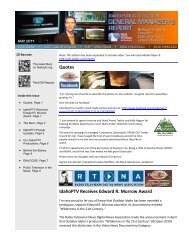Results of a 2009 GfK Roper Public Affairs ... - WPBT Channel 2
Results of a 2009 GfK Roper Public Affairs ... - WPBT Channel 2
Results of a 2009 GfK Roper Public Affairs ... - WPBT Channel 2
Create successful ePaper yourself
Turn your PDF publications into a flip-book with our unique Google optimized e-Paper software.
#<br />
1<br />
PBS is<br />
in <strong>Public</strong> Trust<br />
<strong>Results</strong> <strong>of</strong> a <strong>2009</strong> <strong>GfK</strong> <strong>Roper</strong> <strong>Public</strong> <strong>Affairs</strong> & Media survey<br />
comparing public service institutions
For the sixth consecutive year, the American public has rated PBS the<br />
most trustworthy institution among nationally known organizations<br />
and an excellent use <strong>of</strong> tax dollars. This year, the study included<br />
questions to gauge satisfaction with children’s programming across broadcast<br />
and cable networks; PBS prevailed as the favorite.<br />
The annual national survey was conducted by the non-partisan, international<br />
research company <strong>GfK</strong> <strong>Roper</strong> <strong>Public</strong> <strong>Affairs</strong> & Media in January <strong>2009</strong>. The report<br />
captures the results <strong>of</strong> an opinion survey that included 1,009 participants across<br />
the country and measured how American adults ages 25 to 75 rated PBS in<br />
comparison with other public institutions, including television broadcast and<br />
cable networks.<br />
The following graphs highlight the main points <strong>of</strong> this survey. The full <strong>GfK</strong><br />
<strong>Roper</strong> report is available at pbs.org/roperpoll<strong>2009</strong>.<br />
<strong>GfK</strong> <strong>Roper</strong> <strong>Public</strong> <strong>Affairs</strong> & Media is a division <strong>of</strong> <strong>GfK</strong> Custom Research North America specializing<br />
in customized public opinion polling, media & communications research, and corporate reputation<br />
measurement – in the US and globally. In addition to delivering a broad range <strong>of</strong> customized research<br />
studies, <strong>GfK</strong> <strong>Roper</strong> <strong>Public</strong> <strong>Affairs</strong> & Media draws from <strong>GfK</strong>’s syndicated consumer tracking services,<br />
<strong>GfK</strong> <strong>Roper</strong> Reports ® US and <strong>GfK</strong> <strong>Roper</strong> Reports ® Worldwide, which monitor consumer values, beliefs,<br />
attitudes and behaviors in the US and more than 25 other countries. Headquartered in New York, <strong>GfK</strong><br />
Custom Research North America is part <strong>of</strong> the <strong>GfK</strong> Group. With home <strong>of</strong>fices in Nuremburg, Germany,<br />
the <strong>GfK</strong> Group is the No. 4 market research organization worldwide. Its activities cover three business<br />
sectors: Custom Research, Retail and Technology, and Media. The Group has more than 115 companies<br />
covering 100 countries. For further information, visit: www.gfk.com
&<br />
PBS Trust<br />
How much do you trust each organization<br />
Percent saying they trust the organization “a great deal” (on a four-point scale: a great deal, somewhat, not too much, not at all).<br />
PBS/public television<br />
49<br />
Courts <strong>of</strong> law<br />
27<br />
Commercial broadcast television networks<br />
17<br />
Cable television networks<br />
12<br />
Newspaper publishing companies<br />
12<br />
Federal government<br />
10<br />
Congress<br />
8<br />
0 10 20 30 40 50
&<br />
PBS Value<br />
The federal government provides many services that are funded with tax dollars.<br />
For each <strong>of</strong> the following services the federal government provides using tax<br />
dollars, please rate the value that you receive.<br />
Percent saying each institution is an “excellent” value for tax dollars (on a four-point scale: excellent, good, not too good, poor)<br />
Military defense<br />
23<br />
PBS/public television<br />
18<br />
NPR/public radio<br />
Police/law enforcement<br />
14<br />
14<br />
Federal aid to college students<br />
9<br />
Medical/technological research<br />
9<br />
Space program<br />
9<br />
0 5 10 15 20 25
Who provides PBS most <strong>of</strong> its money<br />
Individuals<br />
35<br />
Foundations<br />
23<br />
Corporations<br />
13<br />
Federal government<br />
10<br />
State governments<br />
3<br />
0 5 10 15 20 25 30 35 40<br />
Is the money that is given to<br />
PBS stations from government,<br />
corporations and individuals money<br />
well spent<br />
<strong>Public</strong> broadcasting receives 15% <strong>of</strong> its<br />
funding from the federal government.<br />
This translates to about one dollar per<br />
person per year <strong>of</strong> government support.<br />
Do you believe this amount is “about<br />
right,” “too little” or “too much”<br />
80<br />
70<br />
80<br />
50<br />
48<br />
60<br />
40<br />
38<br />
50<br />
30<br />
40<br />
30<br />
20<br />
20<br />
10<br />
0<br />
Yes<br />
9 10<br />
No<br />
Not sure<br />
10<br />
0<br />
Too little<br />
About right<br />
9<br />
Too much<br />
5<br />
Not sure
&<br />
How much do you trust the news and public affairs programs that networks broadcast<br />
PBS TV Networks<br />
Percent that trust “a great deal” (on a four-point scale: a great deal, somewhat, not too much, not at all).<br />
PBS/public television<br />
CNN<br />
FOX News <strong>Channel</strong><br />
NPR/public radio<br />
ABC<br />
CBS<br />
NBC<br />
MSNBC<br />
21<br />
21<br />
20<br />
19<br />
27<br />
26<br />
28<br />
43<br />
0 10 20 30 40 50<br />
In your opinion, how<br />
important is it that we<br />
have public television /<br />
commercial broadcast<br />
television / cable<br />
television<br />
Percent saying “very important” for each<br />
question (on a four-point scale).<br />
On the whole, are you<br />
satisfied with the current<br />
public television /<br />
commercial broadcast<br />
television / cable television<br />
programming<br />
Percent saying “very satisfied” for each<br />
question (on a four-point scale).<br />
On the whole, are you<br />
satisfied with the current<br />
public television / commercial<br />
broadcast television<br />
/ cable television programs<br />
for children 2-8<br />
Percent <strong>of</strong> parents saying “very satisfied” for<br />
each question (on a four-point scale).<br />
70<br />
40<br />
50<br />
60<br />
50<br />
40<br />
30<br />
20<br />
10<br />
62<br />
PBS/public television<br />
Commercial broadcast television<br />
44<br />
39<br />
Cable television<br />
30<br />
20<br />
10<br />
35<br />
PBS/public television<br />
Cable television<br />
22<br />
Commercial broadcast television<br />
16<br />
40<br />
30<br />
20<br />
10<br />
48<br />
PBS/public television<br />
Cable television<br />
30<br />
Commercial broadcast television<br />
16<br />
0<br />
0<br />
0
&<br />
When it comes to news coverage, investigations and discussions <strong>of</strong> major issues,<br />
would you say these networks’ programs are strongly liberal, moderately liberal,<br />
moderately conservative, strongly conservative or are they mostly fair<br />
PBS Fairness<br />
PBS/public television<br />
ABC<br />
NBC<br />
CBS<br />
NPR/public radio<br />
CNN<br />
Fox News <strong>Channel</strong><br />
MSNBC<br />
Liberal Mostly Fair Conservative<br />
30 43<br />
12<br />
42 35<br />
11<br />
40 35<br />
13<br />
41 33<br />
9<br />
28 33<br />
9<br />
40 32<br />
12<br />
18 28<br />
40<br />
39 27<br />
11<br />
&<br />
How well do PBS programs—for both children and adults—address these items<br />
PBS Important Issues<br />
Percent saying “very well” (on a four-point scale: very well, moderately well, not too well, not at all well).<br />
Provide people access to arts and culture<br />
62<br />
Promote an understanding <strong>of</strong> American history<br />
52<br />
Improve literacy<br />
50<br />
Promote an understanding <strong>of</strong> science and technology<br />
49<br />
Inform people about America’s ethnic and cultural diversity<br />
46<br />
Provide access to a variety <strong>of</strong> viewpoints<br />
40<br />
Inform people about important political and social issues<br />
39<br />
Inform people about health issues<br />
38<br />
0 10 20 30 40 50 60 70
PBS, with its 356 member stations, <strong>of</strong>fers all Americans —<br />
from every walk <strong>of</strong> life — the opportunity to explore new<br />
ideas and new worlds through television and online content.<br />
Each month, PBS reaches more than 115 million people<br />
on-air and online, inviting them to experience the worlds<br />
<strong>of</strong> science, history, nature and public affairs; hear diverse<br />
viewpoints; and take front row seats to world-class drama<br />
and performances. PBS’ broad array <strong>of</strong> programs has been<br />
consistently honored by the industry’s most coveted award<br />
competitions. Teachers <strong>of</strong> children from pre-K through 12th<br />
grade turn to PBS for digital content and services that help<br />
bring classroom lessons to life. PBS’ premier children’s TV<br />
programming and Web site, pbskids.org, are parents’ and<br />
teachers’ most trusted partners in inspiring and nurturing<br />
curiosity and love <strong>of</strong> learning in children. More information<br />
about PBS is available at www.pbs.org, one <strong>of</strong> the leading<br />
dot-org Web sites on the Internet.


